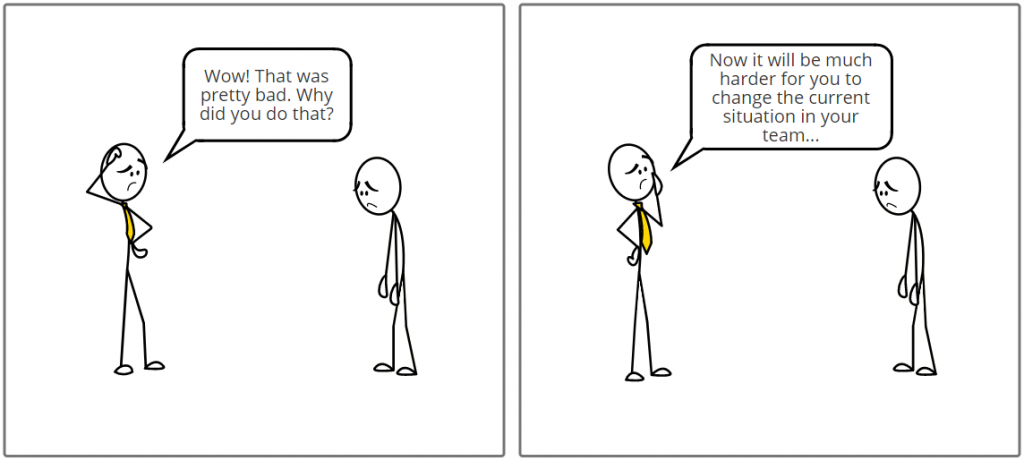
Don’t give advice automatically
When someone shares a problem with you, it doesn’t mean that you need to automatically give them advice. Even if you have good intentions, it can simply backfire. Advice can be treated as criticism or even an insult, especially if you give it in a poor way.
Unsolicited advice can give the other person the feeling that he or she is less competent and cannot handle a situation. Imagine that you’re an experienced lawyer working in a bank. While sipping coffee in a social room, you decide to chit chat a bit about your current challenge at work. But suddenly some random guy, who has no expertise in law appears and tells you how you should solve the puzzle. He shares his own opinion about the paragraphs in civil code and lectures you on what you should do.
Maybe he just wanted to help you or he selfishly thought it’d boost his ego, but chances are high you won’t treat it as a gift either way. You will even find it quite intrusive if you don’t agree with the given advice. According to a study [1], unsolicited advice is poorly received and it’s not recommended to give advice automatically:
“(…) whereas explicitly solicited advice is perceived as cooperative and helpful, unsolicited advice is considered to be intrusive (i.e., an attempt to ‘‘butt in’’), a form of criticism.“
Sometimes it’s just enough to listen and empathize. The most convenient moment to give advice is when you’re asked for it. That’s for sure.
Avoid judging
That’s especially important when someone initiates a conversation and comes directly to you for help. It means that this person already trusts you and believes you’re an expert worth asking for an opinion. It would be completely inappropriate to be judgmental or condescending in such a situation. That’s the quickest way to make any relationship worse.
You can be almost sure that after you pass judgment on someone’s behavior, that person won’t come to you for advice next time. That’s why you should resist being opinionated, for instance, in such a way:

You won’t help your teammate with such judgmental words and, what is worse, you will create a major barrier between you (the superior) and your colleague (the subordinate).
Make sure your advice is relevant to the problem
It sounds a bit ridiculous but it actually happens. I sometimes hear advice or even whole speeches that are completely unrelated to the problem. That’s one of the most frustrating things that can happen to a person who asks for advice or just explains his or her problem.
Tailor your advice to the person and his or her exact problem. Maybe it’s true that many problems come from the same list and they have a tendency to recur. And if you’re an experienced leader, you probably frequently hear about problems that you’ve already heard before. They are repetitive. But you have to treat each case individually anyway.
Help your interlocutor think through the problem
When you share advice, it’s easy to fall into the trap and assume that you’re an expert and you’re the one who should impose your own opinion. Instead of finding the best solution it’s tempting to persuade someone to your own point of view, which of course can be dangerous. What if the other person doesn’t agree with you? An argument is coming!
Instead of imposing an opinion it’s better to give people an opportunity to talk a bit. Simply walk them through different options and let them decide what’s best. Ask questions you would ask yourself, let them speak, listen and discuss. What do you think might be helpful? What do you think about this? Act like a coach, not a superior expert.
“Sometimes, having a ‘good impact’ involves deliberately opting not to persuade.”
Reeshad S. Dalal
Give the other person an opportunity to talk through the options. Don’t choose the best suitable solution yourself even if it’s easier. The aim of giving advice is not to boast about your expertise but rather to solve the real problem.
Keep the structure simple
Advice should be like every good speech. It should have a clear and simple structure that makes it understandable. It means that there should be an introduction, a body and a conclusion that highlights why this advice is worth following. The last part is particularly meaningful.
It’s always a good idea to base your opinion or advice on something concrete. To provide justification for it. To explain why it’s worth following. If your colleague asks you how much of a pay raise he should ask for, you can back up your opinion on something real. You can mention a pay report that you’ve read or your friends working in other companies. Thanks to such tangible evidence, your advice will be more credible and the other person will understand “why” it’s worth considering.
Offer support
Even if you give your teammate the best possible advice. The one that is brilliant and simple, the hardest part is yet to come, that is, implementing it in real life. It’s easy to listen or read about solving a problem, but it doesn’t have any value unless you use it yourself.
If you want to make sure your advice will be used, offer not only genius advice but also support. I suggest showing your insight into the problem and the will to help:

Remember not to pressure people too much. Make sure it’s more like a collaboration. Like an offer of help, not a full-time coaching assignment. In the end, it should be up to them whether they take your advice or not.
Conclusion
Quite often it’s just wise to resist giving advice at all. Especially if you’re not asked for it. But when you need to do it, do it right by delivering your message clearly and in a supportive way. Sometimes people don’t want to hear you boast about your great expertise. Sometimes they just want you to listen to their challenges and help them think through different options.
References
[1] Bonaccio, Silvia & Dalal, Reeshad. (2006). Advice taking and decision-making: An integrative literature review, and implications for the organizational sciences. Organizational Behavior and Human Decision Processes. 101. 127-151. 10.1016/j.obhdp.2006.07.001.